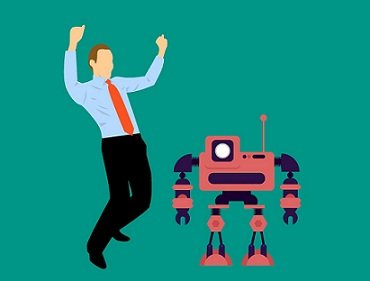Introduction
You wouldn't be wrong to infer that we're in an era of industrial automation (all thanks to the technology of Artificial Intelligence) which is the basis for the 4th industrial revolution. But all these digitalizations and automations, do they pose any serious effect on our humanity? And how are they set to alter the course of our existence? - All these; and more; would be considered in this post.

[Image Source: Pixabay. CC0 Licensed]
To say that we're experiencing (or rather; in the midst of) a massive revolution in the field of technology is to say the least. Take for example: in the computing world; just in the recent past, the computational power of systems that were considered as the world's fastest then only did a handful of calculations in minutes. But in this era, we've seen cray supercomputing beasts that are capable of cracking billions of calculations in just one split second - just like the newly launched Tianhe-2. Imagine what this would do to the computing world - the whole world's data can be processed in minutes, and this; no doubt; would create more human dependency on computers instead of our natural brain power.
Well, maybe this would give you a little shocker; according to this report; it has been proven (based on the paleontological study of relevant fossils - skulls, particularly) that the Homo neanderthalensis (Neanderthal man) had a much bigger brain size when compared to the Homo sapiens. I'm sure you've already figured out what the cause of this could be. And not just that; even down the line to the extant Homo sapiens sapiens (modern man) there has been further dwindle in the size of the brain. What used to be up to 1500cc by volume, is now barely 1300cc on the average [ref] - this can be directly queried on our over-reliance and over-dependency on computing devices.
I mean, why should I even stress my brain to perform complex mathematical tasks when I can lay hold on computers and calculators? - and that's how the brain size has so much degenerated. And remember the law of "Use and Disuse" by Jean Baptiste Lamarck that proposes that a body part not often used (or disused) becomes less consolidated upon, while the consolidation goes to the body part often put in use. That is why the arm you use favorably (to lift weights) would get bigger than the other arm over time. In the same way; since we now heavily rely on computing devices in lieu of our brain, why should you be surprised that it is dwindling? Take this scenario as an instance: The ancient hominid species; while leaving their territory for a "long walk", they would be very observant to eye-mark trees, landmarks, et al, so it would aid them in their return. But in this era, we would just pick up our GPS device and navigate our way to any place we want to go... but at the expense of our brain power and volume.

[Neanderthal’s cranium anatomy. Source: Wikimedia Commons. Author: Jason Potter. CC BY-SA 2.5 Licensed]
Still on the brain power; from personal experience; before I got my first smartphone, I had the phone numbers of all my direct nuclear relatives by heart, and I could also memorize my passwords (which are always uniquely long), but these days, I can barely remember a few, because I've saved all in my smartphone - I wouldn't have the need to stack up stuffs in my brain like before. No wonder there has been speculations that we; in this extant form; are actually dumber than before the advent of technological complexities. Though; by capability; the human brain has been proven to store up to 2.5petabytes of data in over 100billion neurons [ref] - To make these figures clearer: 1petabyte = approx 1,000,000,000,000,000bytes, that's an excess of billions of standard textbooks, but how much of it do we actually utilize?
If you've been following my blog lately, you would have discovered I once treated the effect of technology on our physical bodies as humans - like the evolution of humans with lesser muscle mass, because; obviously; machines have replaced the physical exertion of the human muscles, so it wouldn't be surprising if we become weaker with a more sedentary lifestyle. But away from these effects on our bodies; what about our environments, how has technology affected it?
Digitalization and the environment
Before the advent of technology, the majority of the noise and sounds we heard probably came from humans and animals alike. But in this era, the world is becoming heavily noisy - car horns, machine sounds, automobile noises, generator sounds, heavy industries, and all whatnot. No wonder the rate of noise pollution is on the increase. But more disheartening is the fact that some of these machines are powered by biofuel, and the by-products are released into the atmosphere, which causes heavy disruption of the balance of our ecosystem and also air pollution.

[Image Source: Pixabay CC0 Licensed]
People living around heavily industrialized areas can barely breathe in clean air (maybe we should put some fresh air in containers and mail to them, lol). Take this instance: China has been considered one of the most industrialized countries in the world, and the major part of this is hosted in the city of Beijing. No wonder it has been said that the emission of pollutants there has been on the high side when compared to the rest of the world [ref]. How safe would these people be in a couple of years from now if nothing is done about it?
Air pollutants are not the only culprit here; what about land pollutants? Okay here's another scenario: Nigeria has been among the top leading nations in the production and exportation of crude oil. But if you've ever had the privilege to be around some of these oil refineries and oil blocks, you would feel very concerned. Some months ago, a major oil-borne pipeline got ruptured along the Niger delta region, and this spelt a serious catastrophe - the ecosystem was heavily disrupted, people's farmlands worth millions were destroyed (of course, crops can't grow in oil)... and just as you would expect, when the rains came, these spills were washed into the body of water, and I'm sure you would know the effects it would have in the marine habitat - it was R.I.P to a great number of marine creatures.
More so, as by-products of these refineries and heavy industries, the release of greenhouse gases is inevitable. Okay, to a considerably fair extent, the presence of greenhouse gases is useful to the earth, if not, there wouldn't be anything to trap and retain the heat, and temperatures can fall below the threshold we can bear. But when these greenhouse gases become way too much in the atmosphere, what would happen? Of course, the earth would trap more heat, and the overall temperature of the earth would increase, leading to global warming. And when this happens, the icy caps begin to melt, and the coastal cities might go under water. A very minor case was experienced in the coastal areas of Lagos; Nigeria, some months ago, and an entire neighborhood got almost sunk. Imagine what would happen when the polar caps begin to melt from global warming - the level of the oceans and seas would increase, and it could be a permanent farewell to some coastal cities.
So as technology is advancing to next levels, it also delivers some devils with it. Well, maybe this is the price we have to pay for advancing technology. But one thing is sure; the purpose of technology has been to bring assistance to mankind, and I believe the advantages of technology far outweigh the disadvantages.
Conclusion
This era has been greeted with technological advancements, but at what expense? Okay, the truth is, there are "causes" and "effects" to everything. But I ask you; if you were to make a choice either to live in this era with all these technological whatnots, or to go back to the era of the earliest hominid species (maybe the era of the Sahelanthropus tchadensis) with zero tech, which would you prefer?
Thanks for reading
References for further reading:
- Effects of technological advances on our brain
- Comparison between the brain size of the Neanderthals and Homo sapiens
- Effects of greenhouse gases
- Global warming and the effects on coastal cities
All Images are CC Licensed and are linked to their sources
Vote for witness @stem.witness


gif by @foundation
https://discord.gg/mKSKQ7T
One of the reasons Socrates never wrote a book (a technological innovation at the time) was because he believed it would negatively affect his memory, since he wouldn't need to remember as much.
Similar arguments were made when the calculator was invented, people said it would negatively impact our math skills.
I think definitely progress itself shouldn't be blamed for the disuse our brains, much less stalled. Our brains could easily be put to another use. For instance, if easy math calculations can be done by computers, then use the extra time that gives you to solve math equations (proofs, whatever) that computers can't.
So at the end of the day it's laziness that's to blame, not technology.
How do you know it did not happen?
If there is no necessity in using a skill it is just not used in the same way you do not grow your own vegetables and do not raising cattle because you don't have to. This skill indeed shrinks, not so much out of laziness but because there is no existential need discovered in training it.
I would also be lost in the open waters not finding my way looking at the stars - I would need a navigation tool, .... oh what?, no, I would need GPS!
It really depends how much of the population (of a country, nation, community...) needs skills for what. We are no agrarians and we are not building our own houses, so no particular need for skill developing in that area, too.
Guess, you'd have a lot to blame on me - lol - probably I have 0.0000something % knowledge of what is known and worked on in all the professions and sub-professions of the sub-professions - Gosh, how much dependence in this independence!
Have you heard the expression that we are becoming very smart dummies? :-)
P.S. I like Sokrates attitude:) thanks for that piece of info.
P.P.S. my man always says: you don't have to know a thing, just to ask the right people or searching engine. lol. Thats kinda true - in the given circumstances he and I (and probably all internet users) move.
That's all very true. But the reason it happens is because we can advance technology but not (yet) our brains.
In the future, I think, technology and brains will mesh (become one). So your calculator will be in your brain. So you will be able to do all the calculations. I mean, you would like to know how to grow cattle and navigate with the stars etc., right? I know I will!
But even now, as long as people push themselves to the limit, at least some function of ours will be trained to the hilt. Socrates may have had a great memory, but there's also things he didn't know. Like maybe he also didn't know how to grow cattle and stuff, cos it was the farming society that allowed him to stay in place and philosophize while the slaves did everything else. How else was he able to spend most of his time at the Agora?
So they also made inventions that allowed them to do what they really wanted (philosophize and talk about politics). We drive cars so we don't need to walk, and in the future driverless cars will allow us to move without needing to drive! We'll read instead of driving, much like many people now listen to audiobooks while driving. We delegate so we can do more, not so we can do less.
What we have done so far is to "dis-advance" our sense and body skills: cars, trains, planes for moving,
glasses, goggles, telescopes, microscopes, cameras, videos, monitors for seeing,
fire-alarm-systems, scent-sensivitve devices for smelling,
scissors, razors, scalpels, surgery, pads, touch-screens, stirring wheels, buttons, silk, wool, cotton, mohair for touching,
audio-files, megaphones, speakers for hearing.
Now I ask myself: Were we better with our senses before we had those extensions? Could very well be, no? I mean better off in the literal meaning of being better off in using the very sensory parts of our bodies.
It's not an offense, just curiosity. Which comes to mind reading about this topic...
I must kinda laugh because now cyborgish technology comes into play to mix machines with humans to get back the skills we formerly probably had... ? LOL
Not sure if more knowledge is not less knowledge (but of course I would like to know how to brew my own medicine). :-))))!! Pls, don't take me seriously, I am in a silly mood.
Like the argument I was having with a friend during the course of the week. Computers are the least of our problems. We should be more concerned about the other technologies that would outperform us in every task. Think about ASI; artificial Superintelligence; when it goes mainstream, we wouldn't even have any need to put our brains to use.
To say they'll sideline us is to say the least.
We only need to brace up to what's coming ahead.
Thanks for coming around
Well that will be interesting to see, as I'm doubtful anything can really replace us for now and the foreseeable future.
But if they can, let's start with manual labor first, and then move on to replacing the rest of us! :D
Another great post on the subject, @samminator! I often wonder whether the AI will make us like vegetables :D Although, creativity and analytical thinking, for instance, are more complex brain activities than memorizing. But are we going to need them if AI is always performing better than us even in these fields?
Anyway, great post!
You're right there. But when the Artificial Superintelligence (ASI) gets unleashed, we would discover that even our creativity and analytical thinking would be superseded :D
Maybe something worse, lol 😂😂😂
Going by your first paragraphs, I am afraid our overdependence on technology would somehow negatively affect us in the future. You have made some clear points using our contracting head size in contrast to the capability of neandertals. But boss, my own skull is rather getting bigger o
Respect
Hahahahahah. Your skull is getting bigger? Should we run a CT scan to know wassup? 😂😂
Because that may not even imply an increase in brain mass... We need to check what's enlarging the size of the skull :p 😂😂
Thanks for coming bro.
Respect
Welcome air😁
This post has been voted on by the SteemSTEM curation team and voting trail in collaboration with @curie.
If you appreciate the work we are doing then consider voting both projects for witness by selecting stem.witness and curie!
For additional information please join us on the SteemSTEM discord and to get to know the rest of the community!
I'm going to answer with a bit of tongue in cheek, as I presume the last question was asked:
I'm imagining my early ancestors huddled around a fire in a cave. Smoke and particulate matter rose up and filled their lungs--causing long-term lung damage. Which of course they didn't have to worry about because their lifespans were so brief.
I'm thinking about the age of heraldry, the Middle Ages, when people shared their few articles of clothing with a host of parasites and their modest dwelling with domestic animals.
I'm thinking of the labor required to make a loaf of bread. From the sowing, planting, harvesting, to the milling the wheat by hand, with stone.
I'm thinking of a farmer in the 18th century, hooking an animal to a plow and cutting furrows in the ground to prepare it for planting.
I'm thinking of laundry--washed perhaps with lye, by hand, and hung outside to dry.
I'm thinking of the 20th century, getting stuck in my car and having no phone nearby to call for help.
I'm thinking of writing a book, without a computer, without a flash drive to save my files and organize them for me.
None of these circumstances I've thought about seem ideal to me. The problem with technology is not that it exists, or results in reduction in brain size. The problem is, we were foolish in its use. Careless of consequences. We were like adolescents with new driving licenses and no skills. We rushed headlong into the future and made a mess of things.
It wasn't--isn't--technology that's bad. It was our ignorance, our lack of forethought and our greed that was bad.
And, by the way, I don't use a GPS--I use a map. Much more reliable. Unless it's out-of-date :)
An interesting and provocative read. I've had fun putting this response together. I hope it's fun to read.